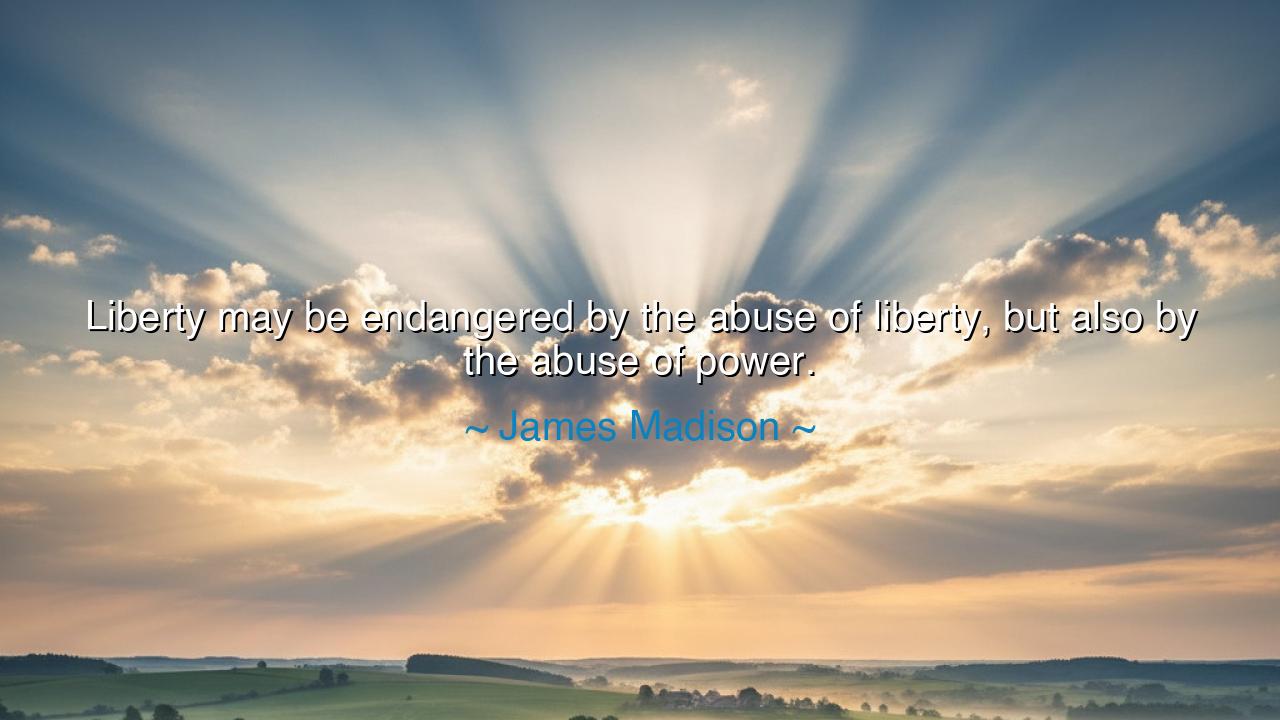
Liberty may be endangered by the abuse of liberty, but also by






“Liberty may be endangered by the abuse of liberty, but also by the abuse of power.” These words from James Madison ring with the wisdom of a man who understood the fragile nature of freedom. In his lifetime, Madison witnessed both the reckless pursuit of freedom without responsibility and the oppressive weight of unchecked power. His insight reminds us that liberty, a treasure cherished by all, can be threatened not only when it is misused but also when it is infringed upon by those who hold power. Both extremes — the unrestrained freedom of individuals and the overwhelming authority of rulers — pose dangers to the health of a free society.
The ancients understood the dangers of both unbridled freedom and absolute power. Plato in his Republic warned against the dangers of an overly democratic society where individuals, in the name of freedom, could act recklessly, undermining the stability of the state. For Plato, liberty without order could lead to chaos, where the desires of the few could trample the rights of the many. Similarly, the great Roman statesman Cicero understood that liberty could not exist in a vacuum; it required a balance with justice and the wise exercise of power. Both Plato and Cicero feared that the abuse of liberty — unchecked freedom leading to disorder — would eventually bring about the need for an authoritarian power to restore order, thereby destroying the very liberty it sought to protect.
Consider the French Revolution, a historical moment where the pursuit of liberty led to chaos and violence. Initially, the revolutionaries sought to free themselves from the tyranny of monarchy, declaring their independence and demanding freedom. However, the resulting anarchy gave rise to the Reign of Terror, where radical leaders, like Maximilien Robespierre, used the very ideals of liberty to justify power and oppression. The unchecked freedom of the revolutionaries led to the abuse of power, where violence and fear became tools for maintaining control. In this case, liberty was endangered not only by its abuse, but by the power that arose in its wake, creating a cycle of destruction and suppression.
On the other hand, Madison also understood the dangers of power unchecked by any constraint. The rise of monarchical power in history, from Napoleon Bonaparte to Adolf Hitler, serves as a stark reminder of how absolute power can crush liberty. Napoleon, having initially brought stability to France, eventually used his power to impose a dictatorship, stripping the liberty of his people and spreading fear across Europe. Hitler’s rise to power, too, began with promises of freedom and a new order for Germany, yet his absolute power led to the systematic annihilation of freedom for millions. These examples show how the abuse of power can lead to the extinction of liberty, a truth that Madison foresaw and warned against.
Ultimately, Madison's words speak to the delicate balance that every free society must maintain. Liberty must be cherished, but it must not become a tool for chaos or destruction. Similarly, power must be wielded with wisdom and restraint, never becoming a force that crushes the very liberty it is meant to protect. The abuse of either — whether it is freedom that leads to lawlessness or power that leads to tyranny — will always threaten the existence of a just and free society. This delicate equilibrium between freedom and authority is the foundation of democratic governance.
In conclusion, let us heed Madison’s warning and strive for a balance that honors both liberty and power, ensuring that each serves the other, rather than undermining it. Liberty, when exercised responsibly, can thrive, while power, when exercised justly, can protect and preserve the freedoms that make it possible. Let us never forget that both liberty and power are fragile, and it is only through vigilance and wisdom that we can safeguard them.






AAdministratorAdministrator
Welcome, honored guests. Please leave a comment, we will respond soon